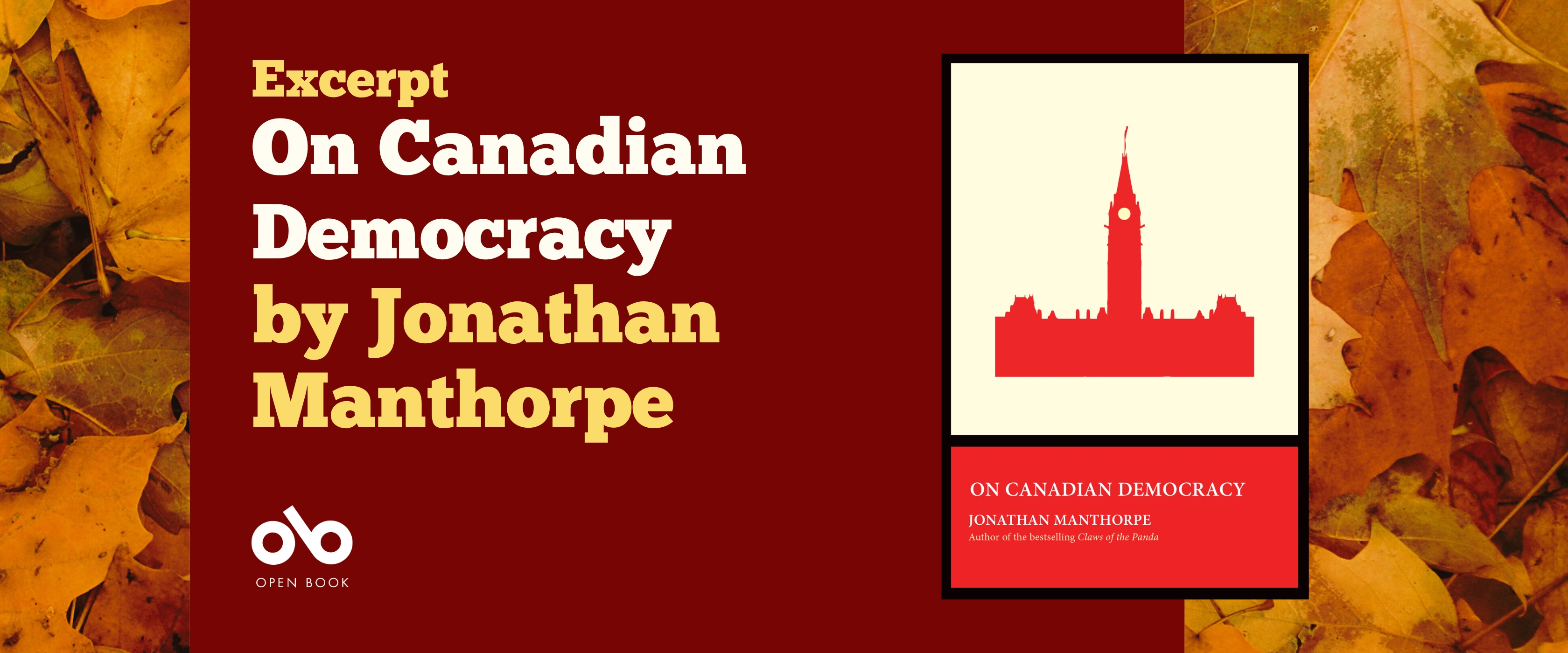Read an Excerpt from On Canadian Democracy by Jonathan Manthorpe
With democracy creaking in various parts of the world, it seems apt that an exploration of Canada's democratic system, and it's strengths and weaknesses, should be represented by the tumbledown building that serves as the official residence of the Prime Minister.
In On Canadian Democracy (Cormorant Books), Jonathan Manthorpe uses this location as a symbol to let the reader into the discussion about what a representative democracy is meant to be, and what it truly is in practice. He examines the foundations of this system, and it's true function as a voice of the people, and offers valuable insights into what work can be done to renovate this political body for the good of all who live in Canada.
We've got an excerpt from this work of political non-fiction that we're happy to share with our readers today.
Read an excerpt from On Canadian Democracy by Jonathan Manthorpe
As I write this book, the fate of our Prime Minister’s official residence, 26 Sussex Drive in Ottawa, is again in the news. I can’t help thinking that in some respects the story of that house is a metaphor for the state of Canadian democracy. The building always was a symbol of a long-gone age and an imported culture. It hasn’t represented the reality of contemporary Canada for a long time. But in the last few decades the house has suffered from neglect that has rotted the very foundations of the structure. That neglect has been driven in part by cowardice and fear of voter backlash against spending the money needed to make the repairs that are obviously required. For fifty years no governing party has had the courage to insist that Canada’s Prime Minister should live in a safe and draft-free house. As a result, 24 Sussex Drive has become vermin-ridden and uninhabitable.
The governance of our country is fast approaching the same fate, and for similar reasons. But in the case of Canada’s political structure, the rot started in the roof and is working its way down to the foundations. The critical failures have been the actions and inactions of our political class and their leaders. They have allowed our politics to become a cultural sibling of sports and reality television game shows. As a result, political parties no longer appeal to the voters on the basis of their policies and the objectives they would pursue in government. Instead, they have adopted the culture of celebrity so that parties identify with the brand of their leader. Party leaders now are chosen not for their abilities as politicians and administrators, but instead for performance skills that can attract public interest at the same level, and sometimes at the same intellectual capacity, as a sports figure or a game show host.
This shift in political culture over the last fifty years is a major contributor to the several factors that have made our Parliament in Ottawa and the legislatures in the capitals of our provinces rather sad irrelevancies. When power comes from the popularity of the leader and not the party, its members, or its policies, then the opposition and the backbenchers ― even the government ministers ― become little more than a cheering section. Another erosion of our elected assemblies is the elevation of the Supreme Court to an appointed and largely unaccountable agency with the power to interpret laws in such a manner as to subvert the legislative process. The 1982 Charter of Rights and Freedoms removed from the House of Commons much of its authority as the sole representative of the voters on all issues, but most profoundly on social issues. The court, in turn, has become problematically activist.
Even though political life of Canada ― like many of the democracies of the North Atlantic ― is in serious trouble, I do not believe that our institutions and communal brickwork have reached the state of decrepitude as that of the Prime Minister’s official residence. The country is not broken. It is not beyond repair. But it does require serious repair. It may even require remaking from the ground up. Take this book, if you like, as a depreciation report. It is a listing of what I think has aged poorly and needs to be replaced or repaired now. It is also a warning of what is to come in the near future, which we should be preparing for now. But it is not a compendium of doom and gloom, at least I hope not. That is not my intention. In every essay, I have set out some options for addressing the problems; or, if those are not obvious, I have put forward aspects that I think Canadians should consider.
_____________________________________
Jonathan Manthorpe is the author of the national bestseller, Claws of the Panda: Beijing’s Campaign of Influence and Intimidation in Canada, and Restoring Democracy in an Age of Populists and Pestilence.
Your CanLit News
Subscribe to Open Book’s newsletter to get local book events, literary content, writing tips, and more in your inbox





